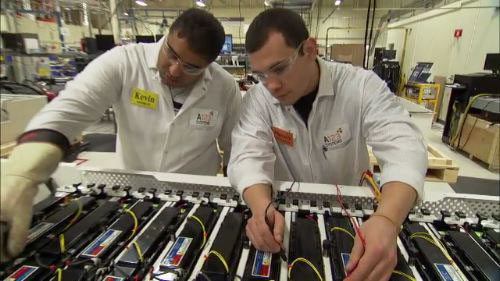Will A123 Become Massachusetts' Solyndra?
 A123 Systems employees make adjustments to a lithium-ion battery pack. (Photo via A123 Systems).
A123 Systems employees make adjustments to a lithium-ion battery pack. (Photo via A123 Systems).
Yesterday, A123 Systems unveiled a new lithium-ion battery called the Nanophosphate EXT. Since it doesn’t need expensive heating and cooling systems to function, it’s a potential game-changer for the battery business. As the New York Times pointed out:
The technology could be used to produce batteries for telecommunications equipment, military vehicles and hybrid gas-electric cars that employ start-and-stop engine systems. It also could yield batteries that could be used to replace the millions of ordinary lead-acid batteries in cars currently on the road.
Even neater:
One battery expert said the new technology’s extended life span could have an immediate impact on the luxury-car market.
“The car company can advertise that this lithium-ion battery is going to last the life of the vehicle, with no need for replacement,” said Ahmad A. Pesaran, an engineer at the government’s National Renewable Energy Laboratory in Golden, Colo.
A123’s future as a company may depend on the success of the new batteries: Despite receiving $249 million in grants from the federal government — part of the Obama administration’s $2 billion program to help the development of electric battery systems) — the company has faltered. They had to recall defective batteries they made for electric sports car manufacturer Fisker, have failed to complete a factory in Michigan, and have seen cash reserves dwindle. Not good signs.
If A123 were to close up, it would expose the Obama administration to more attacks along the lines of Solyndra, the California solar-panel maker which failed despite more than half a billion dollars in government loans. Just two weeks ago, in fact, Mitt Romney held a surprise press conference at Solyndra’s headquarters to attack Obama.
A failure of A123, though, would be a shame. Not because of the political points that would be scored or saved, but because we do need new battery technology — and more important, Massachusetts needs those kinds of tech-savvy jobs to thrive.


